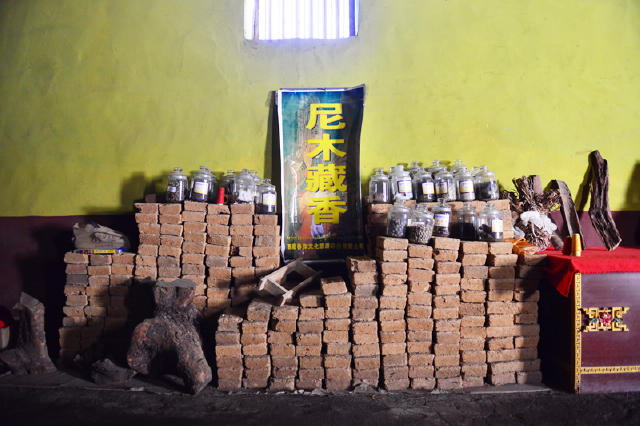Tibet’s Nyemo circulates 1,000 years of Tibetan incense
The Thonpa township in Nyemo County is the hometown of the creator of Tibetan script Thonmi Sambhota. This town's technology for the production of Tibetan incense stems from all of the teachings of this man of the 7th century. Nyemo incense has been acclaimed the first sacred incense of Tibet. It's method for production has been kept secret but it is said that it is formulated from more than 30 types of Tibetan medicine components, and that the production process is very long and rigorous. The Thonpa township, as Thonmi Sambhota’s hometown, is more so the location for handmade production of Nyemo incense. The people living here have inherited the teachings of Thonmi Sambhota and produced Tibetan incense strictly according to all of the rules throughout the process.

Nyemo incense [Photo/agencies]
Simply speaking Tibetan incense only has three steps for creation: 1) dried cypress tree trunk or dried elm tree trunks are cut into small parts and then wooden wedges are used to plug them up and then they are hung in a water arm machine canister and along with the drive of the device day and night non-stop the pieces will be broken down due to friction and hard drive until the point that they have all been ground into wood mud; 2) the processed elm or cyprus is then taken and kneaded with all kinds of fragrant spices; 3) the “fragrant mud” then becomes Tibetan incense. One of the local elderly people that we ran across in the Thonpa township by the name of Sangzhu was just in the midst of taking some of the incense made out from a cow horn it was store to distribute it according to even proportions, this is in fact the key procedure in the production of Tibetan incense, and following this it will be formed into perfectly straight rods. Following it is put into a shady location to dry and after a few days it can be packaged into cases and sold as a commodity. This is the way that it has been produced always for 1000nyears.
Regarding the particulars of Tibetan incense and its origin and development, it is known that it is often used during Buddhist sacrifice activities and also used to ward off evil spirits and bad luck by a small number of households. During sacrificial offerings using incense, our hearts are peaceful and tranquil and nature is calm and steady. To some degree Tibetan people’s intention or aspiration for the production and experimental usage of Tibetan incense has never changed for 1000 years. Irrespective of whether it is the calm and quiet mood required during the process of production, the sincerity or the respect for Buddha brought about by its finalization or its sacrificial offering to the Buddha, all these approaches allow people to experience and embody the devout belief of the Tibetan people with it.
Weather a precious pearl of a snowy region, or a cultural secret, only culture that is living is charming.
Your Comment
Name E-mailRelated News
-
;
-
-
Tibetan railway to boost incense industry
The Lhasa-Shigatse Railway in Tibet Autonomous Region is about to be put into use, after its completion in July. This paves the way for more exchanges between Tibet and the rest of China. One group that will benefit is the Tibetan incense makers in Nimu county, on
-
-
-
Water, incense & medicine, Tibet's future economic engines
Tibet will strive to develop natural drinking water industry and its featured competitive industries such as Khada, Tibetan incense and Tibetan medicine, Chinanews.com reported.
-
-
-

-
Tibetan businessman and his incense dream
Thirty-seven years old Dorje Tseten is an inheritor of a well-known Tibetan incense brand named "holy jewelry".
-
-
-

-
Monastery drives Tibetan incense industry
Tashilhunpo Monastery, located in Shigatse, Tibet's second largest city, is a historic and culturally important lama temple that drives not only tourism, but also other industries in the city.
-
Based in Lhasa, Tibet Vista is a Tibet travel agency that specialized in Tibet permit, and Tibet tours for both private and group travelers at a local price!
•4 Days Lhasa City Group Tour from USD 460 •8 Days Everest Base Camp Group Tour from USD 850 •15 Days Mt.Kailash Group Tour from USD 1780 •2016 Tibet Train Tours from Beijing, Shanghai, Chengdu, Xining,etc










